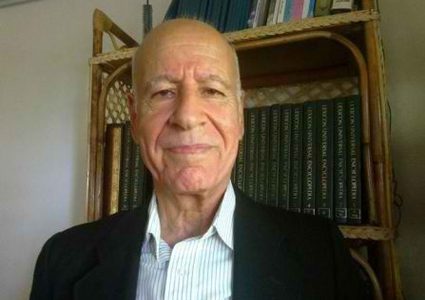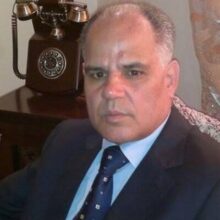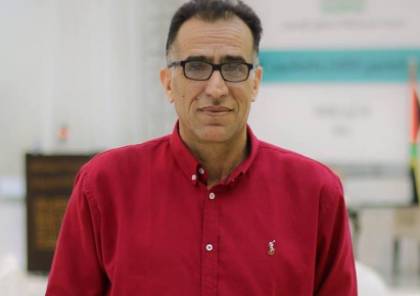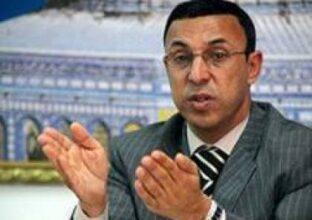Starvation and Forced Displacement in Gaza
Al-Khamisa News Network - Gaza

By: Tawfiq Abu Shomer
He said, crying: I tried to push from my memory the image of my beautiful four-storey house — the house I built over fifteen years is now a pile of stones after the neighboring tower collapsed on it from a bomb dropped by Israeli aircraft — but I remembered the fancy restaurant I supervised the building of in central Gaza; it is a restaurant that served the finest dishes. I recalled that memory because of the hunger I feel in the middle of the night. I could not sleep; I blamed the fear of bombardment and displacement, and the sickness that comes from hunger.
We used to get news not from my old Nokia phone but from the voices and conversations of neighbors who knew the news quickly, even before it aired on the radio.
All news can be borne except the news of being expelled from a place. We left Gaza at the start of this catastrophe for Rafah, where we joined our extended family. Being together eased, to some extent, the tragedy of our destroyed homes, property and shops in central Gaza. We rented a large house in Rafah which somewhat lessened the pain of displacement and starvation, because destruction had hit most of our relatives’ homes in Gaza. We thought we had escaped extermination. We kept hearing a term coined by the occupation forces — “safe zones” — in the Khan Younis and Rafah corridors, but after a month and a half we were forced to move to the Khan Younis corridor when we discovered there were no safe zones under the occupiers. Not long after, Rafah city was occupied, destroyed and many of its residents were killed. We rented an old house in Khan Younis at a high price, thinking it would be the end of our displacement, but after forty-five days we had to leave Khan Younis for the central area, to the Nuseirat camp. There we struggled to rent a modest house in the camp near the power station in Zahra city. We could not sleep because of the sounds of artillery and houses being blown up by aircraft bombs. We could not doze for even an hour because the grinding of tanks and bulldozers stealing homes robbed us of sleep and revived the cycle of displacement all over again!
Mornings in Nuseirat camp were charged with pain because we had to buy food at high prices. Few could afford to buy two tomatoes, two onions and garlic, or to get a bag of bread when its price exceeded one hundred dollars.
All the cash I carried had dwindled to a tiny amount that would not last two days or less. Even paying rent required me to search for a shop whose door was lined with many people waiting to withdraw some of their saved money from the bank with a bank deduction of roughly fifty percent. That means someone who pays one hundred dollars receives only fifty dollars in the currency used — the shekel — and anyone who accepts this rate must take the battered notes from the shop owner. These notes are unusable for purchases and the exchange shop owner would not accept them back if you returned them. Most sellers refuse to take them because they are worn out.
The morning light of our displacement no longer felt as welcome as it did at the start of our exile in Rafah. I feared for my sons and daughters; they had changed and become laborers carrying dough discs after my wife prepared them, searching for a clay oven where they could bake the dough balls using money or by giving up five loaves out of twenty, so that only fifteen loaves remain of the twenty. The oven owner sells whatever bread is available to be able to buy the fuel needed for baking.
No one knew the extent of the pain I felt walking along the road in unclean clothes, because getting water for washing required empty plastic containers, which were rare. When a free water truck arrived, hundreds of youths and children ran behind it carrying their empty containers to join the queue or to seize someone else’s turn by force. I witnessed a knife fight in front of a water truck, which made me ask my two sons to buy water from vendors so they would not be harmed.
I knew the smell of my clothes had become unbearable. I tried to spray a little of the small remaining bottle of cheap cologne on my chest to hide the smell of my clothes and body covered with a layer of sweat.
I pushed away the image of the bathrooms and toilets in my destroyed house and our private well. I had not found a bath for two weeks. I was bathing with a container of no more than ten liters, pouring water cautiously over the sensitive parts of my body to conserve water for my daughters, whose prayer garments had stayed on them for many days and who had not been able to find a bath to wash their bodies!
I was surprised by my children’s great joy at the January 2025 ceasefire agreement. I was not as happy as they were because I would return to remember every stone of the house — in every corner of the house there is a beautiful memory I had hidden in my papers and deep inside me. I explained their joy as a desire to escape the bitter reality we live in, because they do not know how to anticipate what the coming days will bring; they live in the moment.
After our return to Gaza I decided we would all live together in our large, undamaged restaurant. The happiness did not last long, especially as we saw the number of cars lined up on Salah al-Din Street waiting for inspection. We spent two full days waiting our turn despite the short distance between Nuseirat and the Netzarim checkpoint.
For the first time my children’s smiles gave me new hope, which might overcome the pessimism buried in me. I tried to share their smiles, trying to encourage them to look through the window of hope open to their future, because everyone waiting their turn was filled with hope, longing to return to what remained of their homes. I kept trying to push away the despair and hopelessness that flooded me.
When we returned to Gaza we managed to live in our restaurant for only six days, during which we felt we might be able to bring life back to the stones of our destroyed house. We did not expect to be displaced again, and this new expulsion was harsher than the first. The occupiers warned us and ordered us to leave. We could not save some of our belongings in fifteen minutes. Here we are again living in the open, with only a strip of multicolored cloth between us and the sky and our neighbors’ eyes. We live among heaps of people in a large square in northern Gaza.
I did not know the source of the foul smell I smelled while sleeping until I discovered that my pillow and floor covering were located right next to our neighbor’s toilet. I cannot fall asleep for even an hour despite the acrid, toxic smoke from the bombing of adjacent buildings.
My two hungry sons lie next to me; one is a university graduate and the other is in preparatory school. There is a remnant of an old curtain separating my wife and my three daughters from my sleeping area. There is a hole with the torn remnant of a plastic bucket in which we relieve ourselves, knowing that getting washing and drinking water requires half a day of fighting with the large number of people seeking that water!
I will tell you about the meal we ate that day at one o’clock in the afternoon. We ate leftover bread my wife had fried in a black skillet three days earlier, after she had lit some pieces of plastic and some pieces of wood bought at a high price. I used to wipe the remains of the bread with my hand so that spots and patches of mold would not be visible. These moldy pieces were no longer shameful to my family as they had been before the age of starvation. I pretended to my children that I had the same share of food as they did. I chewed a bite of bread and kept moving it around my mouth for a long time so my children would not feel that I fell asleep hungry, although I longed to put a piece of cheese or a falafel patty in the middle of the roll.
I used to hear the neighbors’ conversations, their curses and constant fights clearly. The fighting would stop whenever we heard a nearby explosion. The speakers would look for the place of the blast from inside the tent, joining in long arguments that ended in insults. Before the displacement I had been careful to keep my three daughters away from hearing filthy curses, but in our tattered tent I could no longer keep them from these daily battles!
When I saw pieces of paper fluttering down from the plane, I thought they would be far from my place of displacement, but a group of more than ten men gathered reading the warning and announcing that we were included in the evacuation.
I remembered the line of the poet Al-Mutanabbi: It is enough sickness in you to see death as a cure… and it is enough for deaths to be mere desires!
Note: (This factual account was obtained orally from an acquaintance of mine among the displaced in August 2025)




